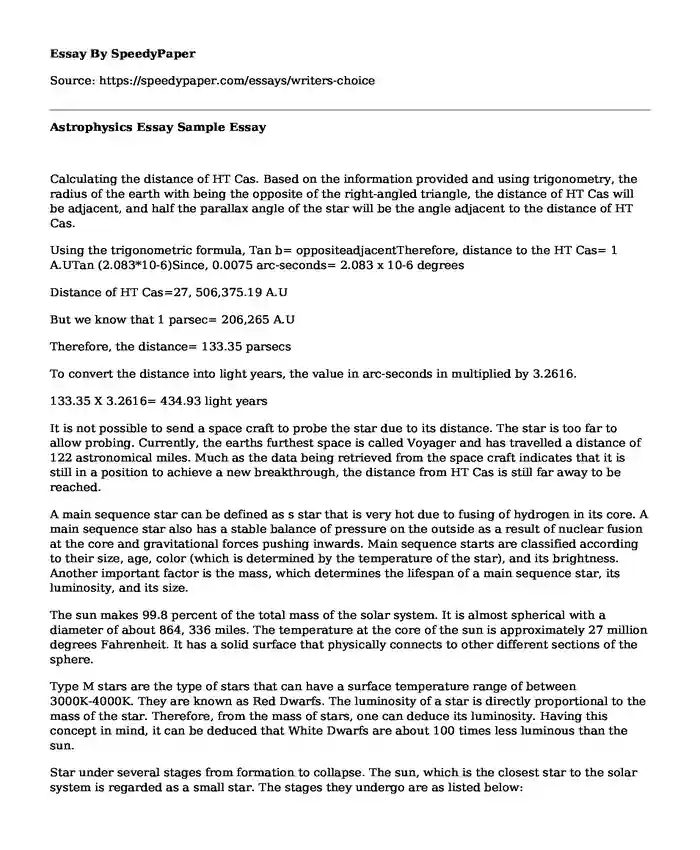Calculating the distance of HT Cas. Based on the information provided and using trigonometry, the radius of the earth with being the opposite of the right-angled triangle, the distance of HT Cas will be adjacent, and half the parallax angle of the star will be the angle adjacent to the distance of HT Cas.
Using the trigonometric formula, Tan b= oppositeadjacentTherefore, distance to the HT Cas= 1 A.UTan (2.083*10-6)Since, 0.0075 arc-seconds= 2.083 x 10-6 degrees
Distance of HT Cas=27, 506,375.19 A.U
But we know that 1 parsec= 206,265 A.U
Therefore, the distance= 133.35 parsecs
To convert the distance into light years, the value in arc-seconds in multiplied by 3.2616.
133.35 X 3.2616= 434.93 light years
It is not possible to send a space craft to probe the star due to its distance. The star is too far to allow probing. Currently, the earths furthest space is called Voyager and has travelled a distance of 122 astronomical miles. Much as the data being retrieved from the space craft indicates that it is still in a position to achieve a new breakthrough, the distance from HT Cas is still far away to be reached.
A main sequence star can be defined as s star that is very hot due to fusing of hydrogen in its core. A main sequence star also has a stable balance of pressure on the outside as a result of nuclear fusion at the core and gravitational forces pushing inwards. Main sequence starts are classified according to their size, age, color (which is determined by the temperature of the star), and its brightness. Another important factor is the mass, which determines the lifespan of a main sequence star, its luminosity, and its size.
The sun makes 99.8 percent of the total mass of the solar system. It is almost spherical with a diameter of about 864, 336 miles. The temperature at the core of the sun is approximately 27 million degrees Fahrenheit. It has a solid surface that physically connects to other different sections of the sphere.
Type M stars are the type of stars that can have a surface temperature range of between 3000K-4000K. They are known as Red Dwarfs. The luminosity of a star is directly proportional to the mass of the star. Therefore, from the mass of stars, one can deduce its luminosity. Having this concept in mind, it can be deduced that White Dwarfs are about 100 times less luminous than the sun.
Star under several stages from formation to collapse. The sun, which is the closest star to the solar system is regarded as a small star. The stages they undergo are as listed below:
Stage 1- the stars are borne in a high density region and condenses to form a huge gas and dust globule then contracts under its gravity.
Stage 2- a condensing matter region will start to gain temperature and will start glowing leading to the formation of Protostars.
Stage 3- nuclear reactions will then take place where hydrogen fuse to form helium.
Stage 4- energy is then released by the star. This prevents the star from contracting even further and makes it start shining. It becomes a main sequence star.
prevents the star from contracting even further and makes it start shining.sand gase. luminosity, and its size.rough, the disStage 5- it remains in this state up to the time that all its hydrogen has fused to form helium.
Stage 6- the core, made of helium, begins to contract further and the shell surrounding the core begins to experience reactions.
Stage 7- the external layers of the star starts to increase in size, cool and become less luminous. The star is no known as a Red Giant.
Stage 8- the core then runs out and the outer layers move away from the core.
Stage 9- eventually, the star dims and cools. After it stops shining, the star is known as a Black Dwarf.
Reference
Shore, Stephen N. (2003). The Tapestry of Modern Astrophysics. Hoboken: John Wiley and Sons.
Cite this page
Astrophysics Essay Sample. (2019, Nov 07). Retrieved from https://speedypaper.net/essays/writers-choice
Request Removal
If you are the original author of this essay and no longer wish to have it published on the SpeedyPaper website, please click below to request its removal:
- Readmission Essay Example
- Free Essay on Emotional Situations
- Cancer Screening Essay Sample
- Free Essay Sample on Green Mark Platinum Award
- Accounting Essay Example: Measurement Techniques
- Medical Marijuana Should Be Legalized - Controversial Essay Sample
- Essay Example: Comparisons Between Deaf Culture and African American Culture
Popular categories





